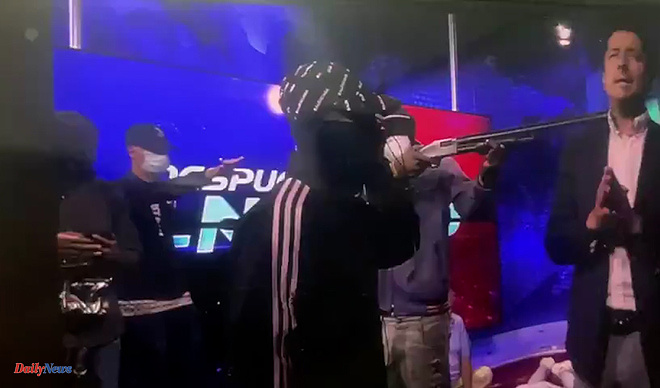A group of about 10 hooded men with long and short weapons and explosives broke into Ecuador's TC Televisión channel during the live broadcast and held some employees to the floor, after which screams and several shots were heard.
The situation at the canal headquarters in Guayaquil, the most dangerous city in the country, became confusing with pleas to "don't shoot," while the hooded men shouted and insulted.
Shortly after, a person's moans of pain could be heard after the shots were fired. The attackers had in their hands apparent grenades and other explosives such as dynamite blocks, with which they intimidated the workers in that environment.
The broadcast lasted just over 15 minutes before cutting off and the screen initially showed the television set and then what looked like the internal facilities of the media outlet.
"Given the entry of criminals into the facilities of a media outlet in GYE (Guayaquil), our specialized units are deployed on site to attend to this emergency," the police published in their account on X.
Shortly after, the Teleamazonas television channel showed at least three hooded suspects against the ground while they were neutralized by agents.
The reporter and news coordinator for GamaTV, another Ecuadorian television channel, José Luis Andrade confirmed that he was alerted to the presence of an explosive device "at the entrance" to the Guayaquil facilities, for which "no one can enter and no one can go out".
He added that police security has been requested for the facilities in Quito.
The situation, still in progress, occurred after the alleged escape of a drug trafficking and organized crime boss, Adolfo Macías, alias Fito, and a regional boss of another criminal gang, Fabricio Colón Pico, and after one early morning with at at least 30 violent acts in nine provinces of the country, with kidnappings of police officers and vehicle explosions.
The Ecuadorian government has responded to the challenge of drug trafficking with the declaration of "internal armed conflict", after the succession of attacks, kidnappings of agents and the takeover of a television channel in Guayaquil. "I have ordered the Armed Forces to carry out military operations to neutralize these groups," stressed the president, Daniel Noboa.
Different criminal gangs have been placed in the State's sights, which have become branches of the Mexican drug trafficking cartels. These are, according to the list that appears in the presidential decree, the Choneros, the Wolves, Águilas, ÁguilasKiller, Ak47, Dark Knights, ChoneKiller, Covicheros, Cuartel de las Feas, Cubanos, Fatales, Gangster, Kater Piler, Lagartos, Latin Kings, Los P.27, Los Tiburones, Mafia 18, Mafia Trébol, Patrones, R7 and Tiguerones.
The new sequence of attacks followed the decision of the Ecuadorian president, Daniel Noboa, to decree the day before a state of emergency and a night curfew for 60 days after confirming the disappearance of the Fito prison, whose whereabouts are still unknown.
At the moment, it seems quite the opposite. "You declared war and you are going to have war. Go out to fight in the streets yourself, do not use the police and military. Anyone found on the streets at night will be executed. Here it is a mafia, it is not a gang, self-conscious, wanting to be Bukele," Second Corporal Sergio Polanco read the message addressed by his kidnappers to the president.
In addition, the Secretariat for the Care of Persons Deprived of Liberty confirmed in a statement on Tuesday the escape during the early hours of the morning from a prison in Riobamba, in the central Andean part of the country, of Fabricio Colón Pico, regional leader of the criminal gang Los Lobos and accused by Attorney General Diana Salazar of preparing an alleged attack on his life.
Colón Pico had been arrested only on Friday as part of an investigation for alleged kidnapping, according to the police.
Fito is the leader of one of the main organized crime groups, known as Los Choneros, with close ties to the Sinaloa cartel, according to authorities. His whereabouts remain uncertain.
The photographs of Pico and Macías appeared on a joint page of the Ecuadorian armed forces and police that offer financial rewards for information leading to the capture of dangerous criminals. On this occasion the amount for each one is not mentioned, but they are part of a publication from the last few hours.
The emergency measure decreed by the government was followed at night and early in the morning by more than 30 acts of violence in the capital and other cities in nine provinces, in addition to prison riots, including the escape of Colón Pico, and the kidnapping of at least four police officers in separate events.
For its part, the police confirmed on the social network another member of that body in the country's capital.
He also reported the arrest of several citizens suspected of one of the explosions registered in the south of the capital. He said that a firearm and 16 pieces of explosives were found on the subjects.
The explosion on a bridge and the fire of a vehicle with gas cylinders in a populated neighborhood south of Quito, as well as a motorcycle on fire in a satellite town of the capital of the Andean country, were reported on social networks and digital media. No injuries were reported in these events.
For its part, the Ministry of Education ordered the suspension of in-person classes and the start of virtual activities in educational facilities that are near state prisons.
The president of the National Court of Justice, Iván Saquicela, in an interview with local radio Democracia said on Tuesday that around midnight an explosion occurred near his home in Quito. "It could be a coincidence or not but it should be investigated because it happens in front of my home," he said. The judge asked that his security be increased.
Several burned cars were also recorded in the cities of Esmeraldas and Riobamba, the city where Colón Pico and an undetermined group of other inmates escaped, of which 12 have already been recaptured, according to the Secretariat for Attention to Private Persons of the Freedom.
Rodrigo Cáceres, governor of the province of Chimborazo, whose capital is Riobamba — 160 kilometers south of Quito — declared to the digital media Diario de Riobamba that Colón Pico had to be relocated on Monday to another prison and that when that provision was going to be carried out, The incidents that ended in the escape occurred.
Given the violence unleashed, the mayor of Quito, Pabel Muñoz, through a statement demanded "all the protection of the State, the government and its security forces to protect the right to life" and requested the militarization of strategic areas of the capital. . The capital's metro has registered permanent military security inside during the last hours.
Meanwhile, the governor of Azuay, Milton Benítez, in a press conference, pointed out that in the Turi prison in Cuenca, - 300 kilometers south of Quito - the inmates have taken over that prison and are holding 49 agents and 12 employees of the prison kitchen.
The Minister of the Interior, Mónica Palencia, said in a statement that the government is working "to recover a state of peace" and that "at this moment the prisons are the specific center of attention."
When declaring the state of emergency, President Noboa warned that he will not "negotiate with terrorists" and that he will not rest "until he returns peace to all Ecuadorians."
The situation occurred in the midst of an environment of chaos and violence that affected a good part of the country, after the alleged escape of two criminal leaders from prison and more than 30 acts of violence, in less than 24 hours, such as explosions, attacks and kidnappings of police officers.












